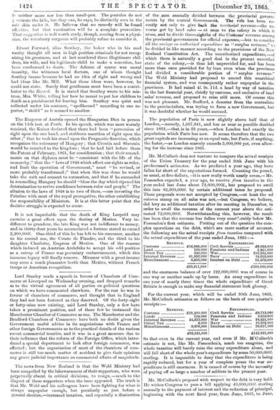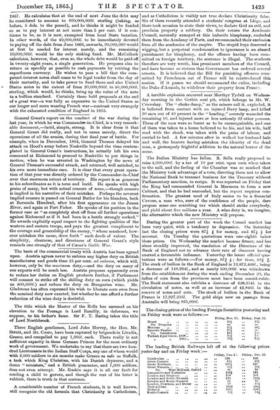Mr. McCulloch's proposal with respect to the debt is very
bold. He wishes Congress to pass a bill applying 40,000,0001. sterling annually to the piyment of interest and the reduction of principal, beginning with the next fiscal year; from June, 1866, to June,
1867. He calculates that at the end of next June the debt may be considered to amount to 600,000,0001. sterling (taking, as before, 5 dole. to the pound), and be thinks it might be funded so as to pay interest at not more than 5 per cent. if it con- tinues to be, as it is now, exempted from local State taxation. In other words, of the 40,000,0001. to be immediately devoted to paying off the debt from June 1866, onwards, 30,000,000 would at first be needed for interest merely, and the remaining 10,000,0001. would be the only sinking fund. Mr. McCulloch -calculates, however, that, even so, the whole debt would be paid off in twenty-eight years, a single generation. He proposes also to return as speedily as possible to cash payments by retiring the superfluous currency. He wishes to pass a bill that the com- pound-interest notes shall cease to be legal tender from the day of their maturity, and to take power to fund these and also United
4e States notes to the extent of from 20,000,0001. to 40,000,0001. sterling, which would, he thinks, bring up the value of the note to a bullion standard. Certainly these bold proposals at the end of a great war—a war fully as expensive to the United States as our longer and more wearing French war—contrast very strangely with the exhausted condition of England in 1815.



































 Previous page
Previous page